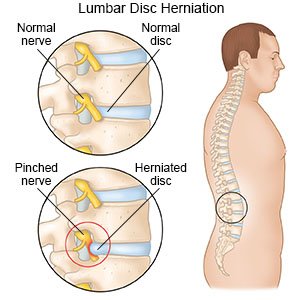Lumbar Disc Herniation
Medically reviewed by Drugs.com. Last updated on Aug 4, 2025.
Lumbar disc herniation occurs when a disc in your lumbar spine (lower back) bulges out. Discs are spongy cushions between the vertebrae (bones) in your spine. The herniated disc may press on your nerves or spinal cord.
 |
DISCHARGE INSTRUCTIONS:
Return to the emergency department if:
- You cannot control when you urinate or have a bowel movement.
- You are not able to move one or both legs.
- You lose feeling in your groin or buttocks.
Call your doctor if:
- You have numbness in one or both legs.
- You have low back pain while resting.
- You have trouble moving one or both legs.
- You begin leaking urine or bowel movement, and it is not normal for you.
- Your pain gets worse, even after you take your pain medicine.
- You have questions or concerns about your condition or care.
Medicines:
You may need any of the following:
- NSAIDs , such as ibuprofen, help decrease swelling, pain, and fever. This medicine is available with or without a doctor's order. NSAIDs can cause stomach bleeding or kidney problems in certain people. If you take blood thinner medicine, always ask your healthcare provider if NSAIDs are safe for you. Always read the medicine label and follow directions.
- Prescription pain medicine may be given. Ask your healthcare provider how to take this medicine safely. Some prescription pain medicines contain acetaminophen. Do not take other medicines that contain acetaminophen without talking to your healthcare provider. Too much acetaminophen may cause liver damage. Prescription pain medicine may cause constipation. Ask your healthcare provider how to prevent or treat constipation.
- Muscle relaxers decrease pain from muscle spasms.
- Take your medicine as directed. Contact your healthcare provider if you think your medicine is not helping or if you have side effects. Tell your provider if you are allergic to any medicine. Keep a list of the medicines, vitamins, and herbs you take. Include the amounts, and when and why you take them. Bring the list or the pill bottles to follow-up visits. Carry your medicine list with you in case of an emergency.
Rest:
Your healthcare provider may have you rest in bed for a few days. It is best to rest on your side with your knees bent. Put a cushion between your knees to help decrease the pressure on your spine and nerves. Ask how long you should rest and when you can return to your daily activities.
Related medications
Heat:
Apply heat to decrease pain and muscle spasms. Apply heat on your lower back for 20 to 30 minutes every 2 hours for as many days as directed.
Physical therapy:
A physical therapist teaches you exercises to help improve movement and strength, and to decrease pain. A physical therapist can teach you safe ways to bend, lift, sit, and stand to help relieve back pain.
Exercise and activity:
Exercises that do not stress your back muscles may help decrease your pain. Examples of low-stress exercises are walking, swimming, and biking. Avoid heavy lifting while your back is healing. Try not to sit for long periods of time. Talk to your healthcare provider before you start any new exercise program.
 |
Do not smoke:
Nicotine can damage blood vessels and make it more difficult to manage a LDH. Smoking also increases your risk for another herniation and delays healing after treatment. Ask your provider for information if you currently smoke and need help to quit. E-cigarettes or smokeless tobacco still contain nicotine. Talk to your provider before you use these products.
Follow up with your doctor as directed:
Write down your questions so you remember to ask them during your visits.
© Copyright Merative 2025 Information is for End User's use only and may not be sold, redistributed or otherwise used for commercial purposes.
The above information is an educational aid only. It is not intended as medical advice for individual conditions or treatments. Talk to your doctor, nurse or pharmacist before following any medical regimen to see if it is safe and effective for you.
Learn more about Lumbar Disc Herniation
Care guides
Further information
Always consult your healthcare provider to ensure the information displayed on this page applies to your personal circumstances.
